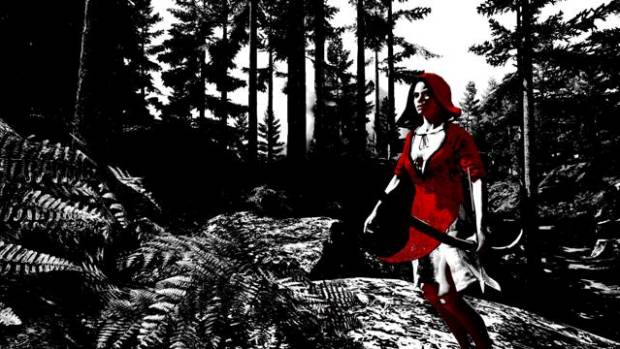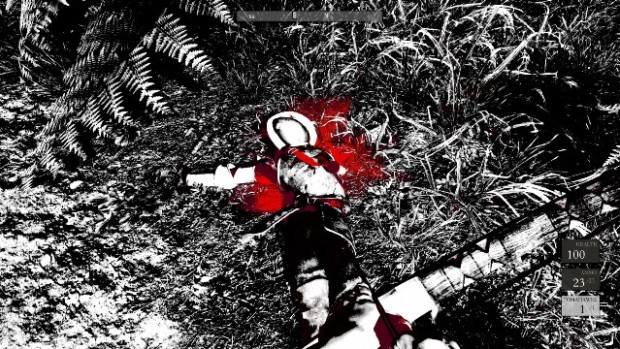Betrayer Review
Sometimes you play a game with a mixture of hope, happiness and disappointment. Happiness and hope because the developers were really onto something, and disappointment because they fell short of the mark.
Betrayer, from Blackpowder Games, looks good and plays fairly well. Its unique art style is very aesthetically appealing to the eye and gives it a nice, fresh feel. The black and white colour and contrast is nice way of shaking things up. With anything of importance coloured red – weapons, chests, objectives, etc. – it makes it much more simple to navigate through the game, otherwise you’d have a very hard time finding your way through. It threw me back to Mirror’s Edge and its red pipes and platforms indicating the way to go.
The game starts off with you on the shore of a beach, not sure whether you went there willingly or were washed ashore, although the crates and barrels scattered throughout the area suggest the latter. You are not told anything and must simply walk. Entering a forest, you come across a strange woman in red that shoots her bow near you, delivering a warning message, telling you to go back –though obviously you aren’t going to do that because that would be a very short game. As you progress and encounter your first enemies, you stumble to a small fort/village. While you scavenge anything you can get your hands on and heal up by drinking water, you will have to hang a bell and ring it. As soon as you ring the bell, that lovely black and white art-style you admired at the start becomes dark, grey, misty and evil. Without spoiling anything, it’s to do with another dimension/world, but you’ll discover that for yourself.

One feature I really enjoyed was the element of the wind and how to use it to your advantage. When you hear the wind picking up and the noise level increasing, you can walk or run and enemies will not be able to hear you, whether approaching or running away. This is very useful as it is very easy to die, and so having that stealth advantage over your enemies is crucial, especially when there is such a large amount of them. Crouch up to a good spot, take your time, pick your method of attack and when the wind comes along, you may be able to defeat a group of enemies without taking a scratch. It is difficult to pull off, truth be told, but extremely rewarding nonetheless.
One problem that can get in the way is an enemy spotting you when they shouldn’t. For example, I had been hidden in a bush and began moving towards an enemy whose back was turned. I was crouched, while the wind was at full effect, so there is no way I should have been spotted; however, it seems that luck was not on my side, as the guard turned around and killed me. This happened on a couple of occasions and became incredibly frustrating as it would cost me my life when, looking at the circumstances, I should have been able to kill him with ease and not take a scratch. But minor troubles aside, using the wind to your advantage is a brilliant stealth component and should be used a lot more in future titles.

The biggest issue with Betrayer, however, is how easy it is to get lost. While the art-style is nice, it does get in the way of travelling and finding landmarks so you know where you are. Without a map, I would have been wandering around for hours with nothing highlighted to show you the way to go. Even though each area isn’t massive, it is still very hard to find your way because of the difficulty in differentiating one area from another. It is even more difficult when the screen turns dark, grey and misty. At one stage, it took me ten minutes to find something that should have taken me two minutes, tops. It’s easy to understand what the developers were trying to do, but after a while, constantly searching for something that should be easy to find becomes very infuriating and makes me want to stop playing. If it happened once, twice or even three times, I might have accepted it and blame it on my own stupidity, but when looking for every objective or item is like to trying to find Atlantis, it turns into a big problem.
Shying away from the negatives, Betrayer does get a lot of things right. It runs very well and it looks great. The game itself is both challenging and, at points, scary. The weapons are simple and easy to use, but difficult to master – you can beat a group of enemies if you are skilled at the game, but you will die a lot if you’re clumsy . The wind is your friend when it comes to taking your time, and you do need a plan when approaching even two enemies, making sure your weapons are reloaded, your health is at a respectable level and that you have a backup plan if it all goes Pete Tong. This is actually more fun than seeing an enemy and taking him out as if you were Rambo. Because you’re not Rambo – you are weak and vulnerable and this game makes you believe it.

VERDICT: It truly is wonderful to see a company try something creative and succeed in at least some areas. The art, the mechanics and the atmosphere all work and come together very well. The downfall, however, is that Betrayer wants to be mysterious, but the inscrutable objectives become too perplexing due to a couple of factors, and as a result the game becomes one big enigma in itself. I can only wonder if my computer would still be with me today had I not had a map for some help. We all like games that aren’t completely linear; we all want games to have twists and turns in the road. But when you play Betrayer, it feels as if Blackpowder Games have stuck you in the Sahara Desert and told you to find your way to China. I believe they had some good ideas and executed a lot of them very well, but when the quality dips it really dips.
Still, there are some decent features in Betrayer. It’s gorgeous to look at and your experience may be different from mine, depending on your luck. If nothing else, it has made me very excited to see what Blackpowder have learned from creating Betrayer, and I hope they can improve on the problems I encountered in the future.

DECENT. A 6/10 indicates that, while this game could be much better, it still has a fair amount to offer the player. It might be an interesting title sabotaged by its own ambition, or a game denied greater praise by some questionable design choices. Don’t avoid it outright, but approach it with caution.
Review code provided by publisher.





